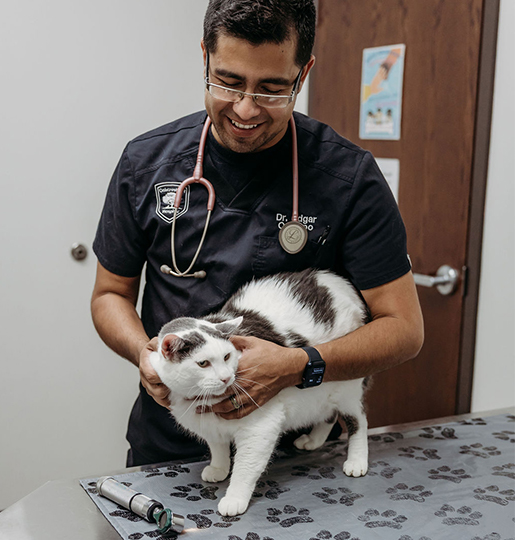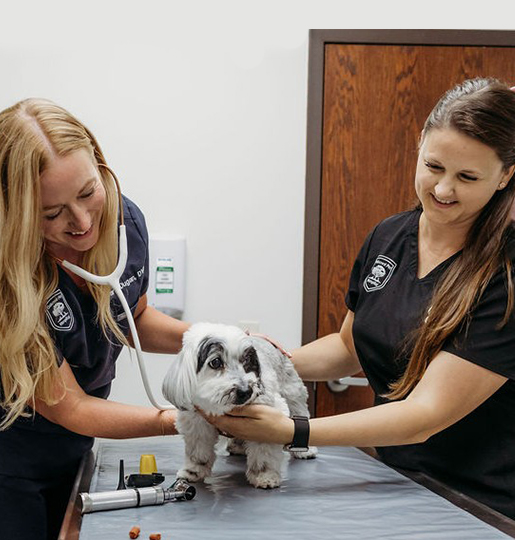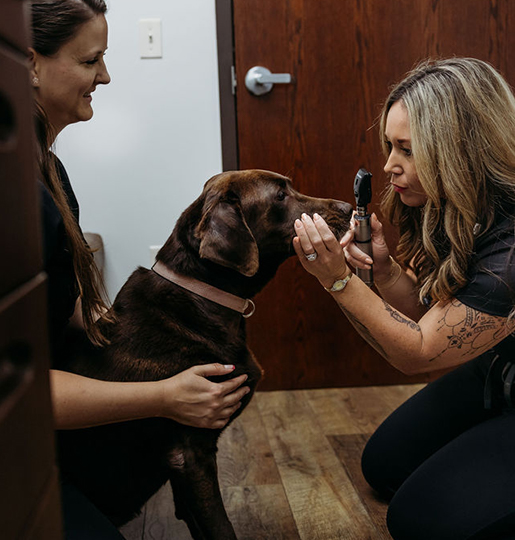Veterinary preventative care is about maximizing health and minimizing risks, both for the animals and their owners. By addressing potential problems early, you’re helping your animal live a longer, healthier life, and saving time, money, and emotional stress in the future.
Preventative care is all about taking proactive measures to keep pets healthy, prevent illness, and catch potential problems early before they become more serious. The goal is to enhance the quality of life and longevity of animals through regular checkups, vaccinations, parasite prevention, and proper nutrition.



Why Preventative Care Is Important
- Early Detection: Preventative care helps catch issues early when they’re easier to treat.
- Cost-Effective: Preventing serious conditions is typically less expensive than treating them once they become severe.
- Better Quality of Life: Keeping pets healthy with regular checkups, parasite control, and proper nutrition ensures they live longer, happier lives.
Key elements in preventative veterinary care include:
1. Regular Veterinary Check-ups
- Annual or Bi-Annual Exams: Regular visits to the vet are crucial for early detection of health problems. During these check-ups, the vet will perform a physical exam, check vital signs, and assess overall health.
- Health Screenings: Depending on the pet’s age, breed, and health status, your vet might recommend blood work, urine tests, or other diagnostic tests to monitor internal health.
2. Vaccinations
- Core Vaccines: These are vaccines that every pet should get, regardless of lifestyle. For dogs, core vaccines might include rabies, distemper, parvovirus, adenovirus, leptospirosis. For cats, core vaccines include rabies, feline calicivirus, feline herpesvirus (rhinotracheitis), and panleukopenia.
- Non-Core Vaccines: These are recommended based on lifestyle factors like exposure to other animals or specific geographical areas. For example, a dog who frequently travels or goes to dog parks may need a Bordetella vaccine (for kennel cough).
- Booster Shots: Most vaccines need to be updated periodically, typically every 1-3 years depending on the vaccine.
3. Dental Care
- Routine Teeth Cleaning: Dental disease is one of the most common health issues in pets, and it can lead to other systemic health problems. Brushing your pet's teeth and scheduling professional cleanings can prevent periodontal disease.
- Dental Chews and Diet: There are also chews and special diets that help reduce plaque buildup and support oral health.
4. Spaying/Neutering
- Health Benefits: Spaying or neutering your pet not only helps prevent overpopulation but also reduces the risk of certain cancers and behavioral issues.
- Timing: Typically done between 6-12 months of age, but your vet can give you advice on the best timing for your pet.
5. Monitoring for Health Changes
- Know the Signs: It’s important to be aware of subtle signs that may indicate health problems. Changes in appetite, behavior, weight, or coat condition can be early indicators of illness.
- Emergency Care: Being aware of common pet emergencies (like choking, poisoning, or severe injuries) and having contact information for an emergency vet is vital.
6. Senior Pet Care
- Increased Health Screenings: As pets age, they may become prone to conditions like arthritis, kidney disease, and dental issues. Senior pets may require more frequent veterinary visits.
- Joint Support: Supplements like glucosamine and chondroitin can help with joint health in older pets, especially in large-breed dogs.
7. Parasite Prevention
- Flea, Tick, and Worm Prevention: Parasites like fleas, ticks, and intestinal worms are common threats. Your vet will likely recommend year-round parasite preventatives, including treatments for heartworms (especially important for dogs).
- Internal Parasite Control: For both dogs and cats, deworming treatments can prevent common parasites like roundworms, hookworms, and tapeworms.
- Environmental Management: Keeping your home and yard clean, especially in areas with high tick or flea populations, is key.
8. Exercise and Enrichment
- Physical Activity: Regular exercise is vital for maintaining healthy joints, muscles, and a healthy weight. It also helps reduce behavioral problems and mental health issues like anxiety or depression.
- Mental Stimulation: Providing toys, puzzle feeders, and interactive activities helps keep pets mentally engaged and prevents boredom.
9. Grooming
- Nail Trimming and Ear Cleaning: Nail trimming prevents overgrowth and potential injury, while ear cleaning can prevent infections, especially in breeds with floppy ears.
10. Nutrition and Weight Management
- Balanced Diet: Good nutrition is essential for preventing obesity and maintaining a healthy weight, which can prevent many chronic diseases like diabetes, arthritis, and heart disease.
- Special Diets: Some pets have specific dietary needs based on age, breed, or health conditions. Your vet can recommend the best food for your pet’s needs.
- Weight Monitoring: Obesity is a major issue in pets, so regular weight checks and adjusting food intake can help prevent weight-related health problems.
11. MIcrochipping
- Microchips are non-removable chips inserted under your pet's skin. It serves as your pet's identification in the event that he/she gets lost.




